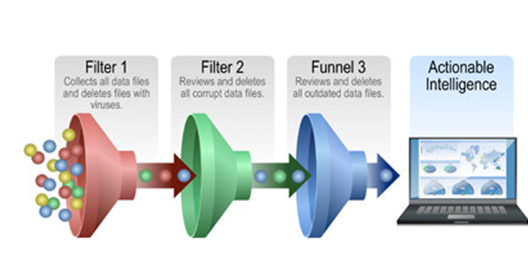ATD Blog
Make Complex Content Simple—Use Visual Metaphors
Tue Apr 19 2016

Brilliant thinkers and orators use this technique to tout their ideas. Scientists instinctively do it when explaining theories to laypeople. Well-liked public figures employ this method to generate support for their organizations and businesses.
What is their secret? Using visual metaphors to make powerful infographics. Visual metaphors can help communicate information that may otherwise be more confusing or time-consuming to share as-is.
For example, imagine you are teaching a new software tool to people who know what they want but are unclear how the new tool will work for them. In their job, they need actionable intelligence based on specific queries entered into a database. The new tool meets their core need; it also gathers large volumes of information and automatically eliminates data that aren’t relevant to their queries through a series of algorithms. In the end, all relevant data are presented in an intuitive graphics user interface that makes the end users’ process more efficient. Confusing, isn’t it?
How might you show this software tool using a metaphor? How will the metaphor reinforce the coded process that occurs to ensure that only the best information is funneled to the end user? The visual metaphor is often used to describe a process to others. In this case, if the data are condensed, show the information sifting through a funnel. A funnel is a great visual metaphor for this topic. The following funnel graphic simplifies the process of the new software tool, while highlighting its key functions:

Using a visual metaphor infographic is an ideal way to communicate any complex concept. It’s easy to do. Think about how you would describe your solution, idea, or process and look for key words that point toward the correct visual metaphor. List the attributes of your subject matter and find an object that has similar characteristics.
The possibilities are endless and will make your educational materials more memorable and more likely to be adopted.
You've Reached ATD Member-only Content
Become an ATD member to continue
Already a member?Sign In
